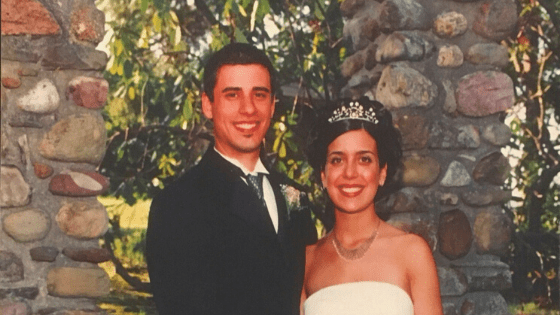Marriage In the Raw: Sex, Conflict, and Other Stuff That Helped Us Make It To Twenty Years
What does it take to have a great marriage? While we haven’t always had a great marriage (I share some of those stories in this post), I can honestly say we do now. Here are some of the secrets that have helped us

On May 6, 2020, Gina and I celebrated 20 years of marriage. We are having a “quarantine anniversary celebration” (it happens to be during the COVID-19 Pandemic) which means: kids in bed early and I’m grilling steak and fish. We hope to take a trip…alone in August, but for now it will have to do!
Though we’ve got a long way to go (we want to celebrate our Golden Anniversary), making it to twenty years isn’t easy considering the average marriage in America lasts just eight years and only half of first marriages make it to twenty years.
If you’ll allow me, I would like to share a little tribute to my wife and a few of the secrets that have helped us make it to twenty years.
Marry the right person!
Jackson Brown Jr. said, “Marry the right person. This one decision will determine 90% of your happiness or misery.”
Ain’t that the truth.
It’s all downhill from there. Though that one bit of advice won’t guarantee a great marriage, without it you are fighting a losing battle. I could do a whole post on choosing the right person, but I will save that for another day. For now I will just say pray, pray, pray and make sure you both have peace from God on this as well as the input of married mentors with good marriages who have been married for an adequate amount of time.
A Tribute to My Wife
As much as I would like to tell you all the things I did right to ensure we would have a lasting and healthy marriage (though it hasn’t always been that way), I attribute much of our success in marriage thus far to my wife, Gina.
Gina, you are the kindest, most intuitive, most resilient person I know. Without your self-sacrifice, perseverance, and genuine love, I don’t think we would be happily married today and possibly not married at all!
Fighting Fair
Though God did bring us together in a clear and unmistakable way (another story for another time), ours is not a fairy tale story of happily ever after since the wedding day. Personally, I have a really hard time relating to people who say they never fight, and marriage has all been peaches and cream.
I recently heard one of those stories on a podcast. I shut it off.
If you don’t ever fight, and you have a healthy marriage, I’m glad for you. I truly am. But I’m probably not for you.
For two children of divorced parents who didn’t really understand how to communicate in a healthy manner, fighting was a reality, especially early on. In the early days, I fought to win, but now I fight for our marriage. When you fight fair and fight for your marriage, arguments can actually be healthy. For someone like me who is an “8” on the Enneagram (like me), a confrontation is a form of intimacy that is actually a sign that the other person is engaged. But there are other benefits to fighting fair as well. When you fight fair, you can show your children how to resolve conflict in a healthy manner.
Our Journey
It was during year 7 that we began marital counseling, and I wish we would have started the moment we got married! It took an eye-opening event and a lashing from a mentor at the time to realize I needed help with my anger problem, and we needed help in our marriage (largely due to my own issues but she had a few of her own as well). To her credit, my wife hung in there when she didn’t have to, through my angry outbursts, hurtful words, and intimidation.
For that, I am forever grateful.
Though I have many faults, one of my strengths is a heart that has always been brutally honest with myself and completely surrendered to Jesus. Therefore, I was willing to take responsibility for my shortcomings and take the initiative to get the help I needed with my anger and the help we needed in our marriage. It was the first step on a long road to health.
There is a lot that happened during years 8-15 including moving to Boston to start a church, having our third child, and going through some of the most painful and difficult years of our lives. These years shaped us and formed us into the people we are today, but I don’t have time to tell you all those stories.
Fast forward to year 16. We were seven years into church planting, in deep with three kids, and were facing a slew of financial challenges. Though our marriage seemed “OK”, neither of us were willing to settle “OK”, and though we weren’t in crisis, it felt like we needed a tune-up. So, we went back for round two of marital counseling. It was during this time that we arrived at some significant revelations about ourselves and our marriage, learned to communicate in a healthier manner, and everything went to another level.
I can honestly say the last five years have been the most healthy and fruitful in our marriage thus far. Apart from choosing the right spouse, and direct help from God, here are seven of the most important things we have learned along the way that will be helpful to you. A few of them have to do with faith. If that’s not you, feel free to skip over them.
1) “Marriage was designed to make us holy more than to make us happy.” (Gary Thomas, Sacred Marriage ). It’s not that we shouldn’t be happy in marriage, it’s that we find true happiness when we become more like Christ. In the end, God uses relationships – almost more than anything else – to mold us into His image and grind the rough edges off our character.
2) Conflict sucks but use it to your advantage. Conflict resolution is hard. Stating things in a way that is not accusatory really helped us. Instead of “You did this and it made me feel this way” try this: I felt__________when you__________. It takes the emphasis off them and puts it on how you felt rather than what you think they did. Instead of “you did this” or “you did that”, starting with “I” causes people to let down their guard. Beyone that, if things get heated and you need to take a break, then take a break! But make sure you come back to it after an agreed-upon amount of time so you don’t leave it hanging forever. Another communication technique that is really helpful is called reflective listening. Basically you want to hear and understand what the other person is communicating through words, tone, and body language and respond back to them something like this, “This is what I’m hearing you say, do I have that right?” In doing so, miscommunications and misunderstandings will be minimized, and they will actually feel heard in the process. It also causes you to as the listener to engage more fully because you know you are going to need to share with them what you heard!
3) Have sex regularly and “just show up”. When it comes to marriage, sex isn’t the most important, but it’s certainly in the top 3-5! With three kids and both of us working (often multiple jobs) it can be hard to be consistent, but this really helped us. In my mind, once per week is the minimum and to do that you need to think through your spouse when are the best times for that. My suggestion would be to plan a weekly time and then if it happens spontaneously it’s a bonus! Our counselor’s advice was when you get there “Just show up!” In other words, put no other expectations on each for that time other than to show up. You are there together and you are both naked. That should be enough. Take off all other expectations you’ve played up in your mind of what that time should be. Of course, there is a lot more that goes into a healthy sex life, but this was a game-changer for us.
4) Don’t shut up. Talk every day if you can. Most researchers say you need at least twenty minutes of daily communication to have a healthy relationship. Common guys, you can tune-in to her for twenty minutes. During that time, shut off your phone, remove distractions, and practice reflective listening: “This is what I hear you saying. Is that right?”
5) The couple that prays together stays together. It sounds cliché but it’s true. We’ve had ebbs and flows when it comes to praying together regularly, but a healthy prayer life is actually a sign that other things are working well. When we aren’t communicating well, and we’re not getting along, we have a very hard time praying together… until we get it right. Additionally, we believe there is a very real and direct attack against marriage because it is a physical representation of the spiritual reality between Christ and His Church. That’s why we pray with and for one another. The truth is we wouldn’t have made it very far without God. For us, God is not a compartment of our lives. He is the center of everything – including our marriage. You’ve probably heard it at weddings but it’s worth repeating this thought by Solomon uttered in the book of Ecclesiastes, “ Though one may be overpowered, two can defend themselves. A cord of three strands is not quickly broken.”
Without God at the center, I don’t think we would have made it past year seven or eight. Believing God brought us together, praying together, having His power and help, and the conviction that marriage is a life-long monogamous relationship was the glue that held us together.
6) Pursue her like you did before you were married. Admittedly, I need to up my game in this. Men, remember how you pursued your wife before you were married? Don’t stop! Your wife wants to be pursued. When life gets busy and full, this can be a tough one, but it’s worth it. If you can’t afford a babysitter or don’t have one be creative! Trust me I know, we’ve lived on a pastors salary in Boston – one of the most expensive places in the United States. And yet we’ve always found creative ways to date. It could be as simple as a walk, coffee, or sending the kids to bed early so you can watch a movie and have dinner together…alone! We have done dates monthly, every other week, and in certain seasons every week, but usually it’s every other week for a date. Beyond that, we also try to take a yearly time away. I know some people recommend more, but we don’t necessarily have someone to watch our children more often and they are not old enough yet to stay home alone overnight. So, we take what we can get.
7) You need help so you may as well get it now! The time for pride is over. Most people err on the side of waiting too long, but why not step up to the plate and get the help you need before you find yourselves in a crisis? Your pride is a small price to pay if it means having a healthy marriage! Also, don’t be afraid to go back for a tune-up from time to time. Like a car, your marriage needs a tune-up from time to time to run well. A good Bible-based counselor and good mentors will go a long way. Never be afraid to ask for help.
A Three-fold Cord
There is a lot more I could share from being married for twenty years, but those are a few things that have been crucial on our path to a healthy marriage. We still have a long way to go, but we are more committed than ever to being on the journey together and not having a good marriage but having a great one.
Here’s to the next twenty years and beyond.
Share this Post:











